The article titled "10 Hotel Room Trends Shaping Guest Experiences in 2025" examines the transformative trends in hotel room design and amenities that significantly enhance guest experiences. It underscores that advancements in technology, sustainability, personalization, and wellness are pivotal factors influencing these trends, as hotels strive to adapt to the evolving expectations of travelers within a competitive marketplace.
As the hospitality industry prepares for 2025, a seismic shift in guest expectations is reshaping hotel room trends. Accommodations now face the dual challenge of providing comfort and enhancing the overall guest experience through innovative technologies, sustainable practices, and personalized services. This article delves into ten transformative trends poised to redefine how hotels engage with their guests, offering insights into strategies that establishments can adopt to thrive in an increasingly competitive landscape.
What approaches will hotels implement to meet the evolving desires of their clientele while maximizing operational efficiency and revenue?
Strategic revenue management is vital for accommodations aiming to optimize pricing and inventory, guaranteeing that guests can access the best available rates. By leveraging data analytics, establishments can implement dynamic pricing strategies that adapt in real-time to fluctuations in demand, seasonal trends, and competitor pricing. This method not only improves the booking experience by presenting competitive rates but also maximizes revenue potential.
Furthermore, effective channel management is crucial for distributing room inventory across diverse sales channels, thereby amplifying revenue opportunities. Advanced revenue management techniques empower accommodations to pinpoint peak booking periods and modify their strategies accordingly, ensuring that visitors perceive exceptional value for their investment.
Collaboration among various departments, including sales and marketing, is essential for aligning revenue management strategies with overarching business objectives. As the hospitality sector evolves in 2025, embracing these hotel room trends and flexible pricing strategies will be imperative for accommodations to thrive and meet visitor expectations.
To implement these strategies effectively, accommodation owners must consistently analyze market data and adapt their accordingly. [Collaborating with Lights On](https://lightson.co/about-us) can further enhance these initiatives, providing expertise in revenue management projects and optimizing visitor booking processes through strategic marketing efforts.
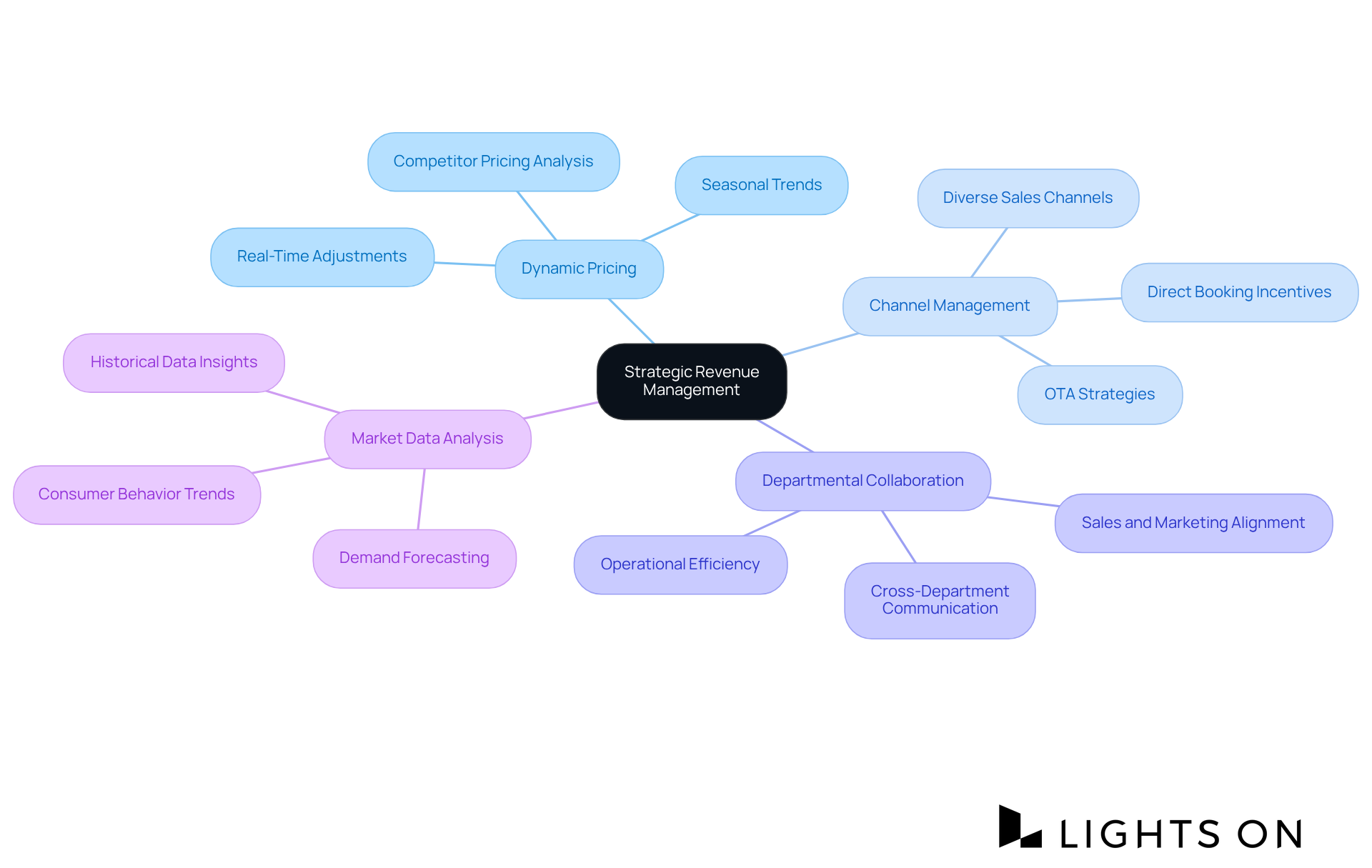
AI technologies are revolutionizing hotel operations by significantly enhancing visitor interactions and streamlining processes. Chatbots now offer immediate replies to questions, while tailored suggestions based on prior visits create a more engaging experience for visitors. This level of not only meets but often exceeds visitor expectations, fostering loyalty and encouraging repeat visits.
Furthermore, AI optimizes operational efficiency by predicting occupancy rates and adjusting staff allocation accordingly. This guarantees prompt service, which is vital for customer satisfaction. A notable example is the Palácio Estoril Hotel, which has successfully implemented machine learning to enhance profitability through improved resource management and dynamic pricing strategies.
Statistics reveal that:
As hotels increasingly adopt AI solutions, they are not only enhancing visitor experiences but also adapting to the latest hotel room trends to position themselves competitively in a rapidly evolving market.
In addition, industry leaders highlight the significance of AI in hospitality, with:
As accommodations continue to adopt AI, the future of hospitality appears bright, with technology leading to more tailored and efficient visitor experiences.

In 2025, have evolved into a standard expectation among visitors. Hotel room trends now include the integration of sustainable materials, energy-efficient appliances, and water-saving fixtures into their designs. By endorsing these sustainable initiatives, accommodations not only reduce their ecological footprint but also attract an increasing demographic of environmentally conscious travelers. Implementing sustainability practices can significantly enhance visitor satisfaction and loyalty, as many individuals prefer to support businesses that prioritize environmental responsibility.

Smart innovations are fundamentally transforming hotel room trends, enabling guests to effortlessly control lighting, temperature, and entertainment systems via smartphones or voice commands. This degree of customization greatly improves comfort and generates lasting memories, making stays more enjoyable.
Hotels that adopt advanced solutions not only stand out in a competitive market but also reflect the current hotel room trends, catering to the growing demand for convenience and modern amenities. To effectively promote these features, property owners can emphasize the advantages of in advertising materials, demonstrating how they enhance visitor experiences.
Furthermore, providing virtual tours or demonstrations of smart room features on the establishment's website can attract tech-savvy travelers. These innovations also produce valuable insights on visitor preferences, enabling accommodations to further tailor their services.
As we approach 2025, hotel room trends suggest that the incorporation of advanced technology is anticipated to become a common expectation among travelers, with 71% of patrons expressing a preference for accommodations that provide self-service technology, including mobile controls and automated systems.
This shift towards automation not only enhances visitor satisfaction but also streamlines hotel operations, allowing staff to concentrate on delivering exceptional service. The future of hospitality lies in creating connected and automated environments that prioritize visitor comfort and convenience, reflecting the latest hotel room trends while effectively marketing these advancements to attract more reservations.
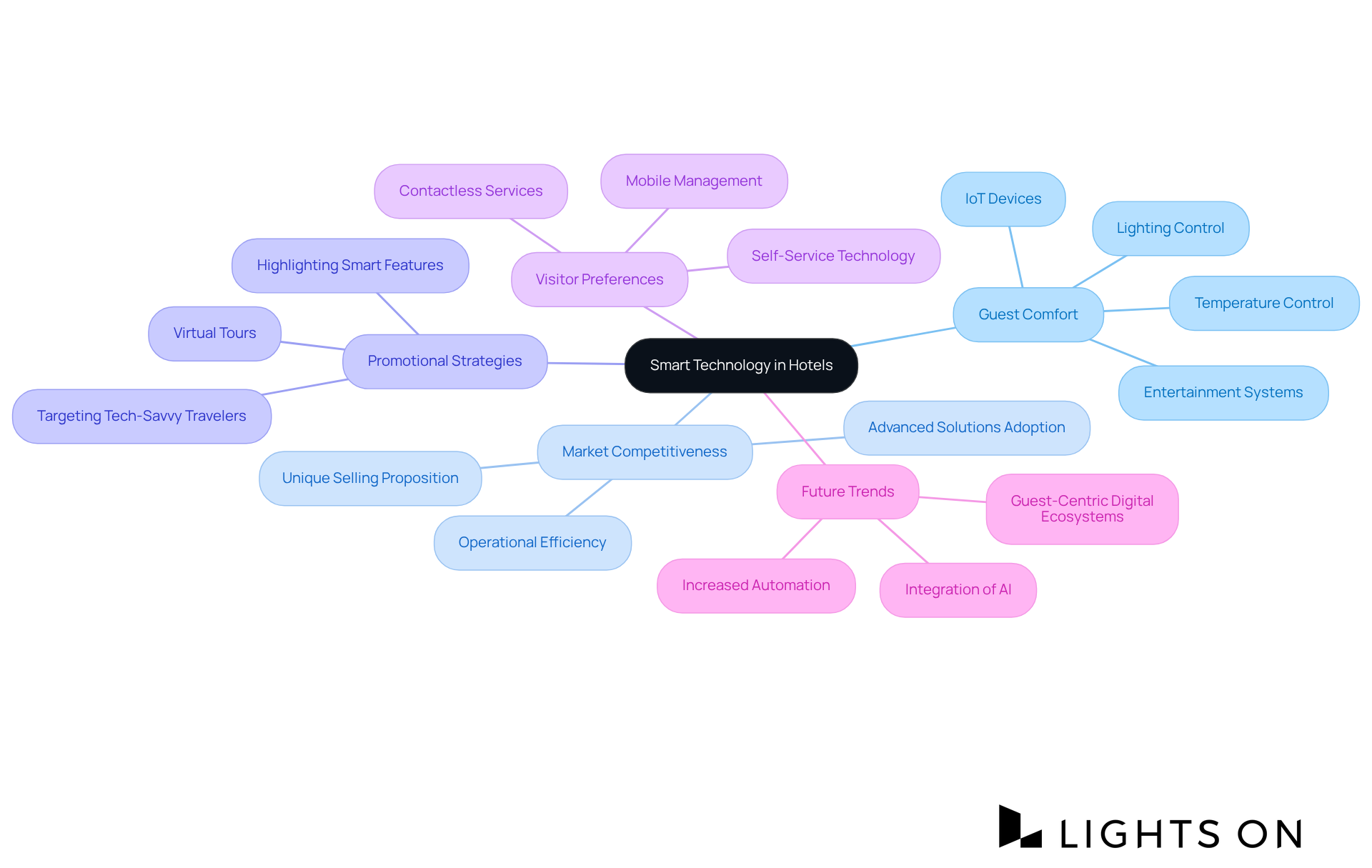
Contactless systems, including mobile check-in/check-out, digital room keys, and contactless payment options, are revolutionizing the hospitality industry. These innovations significantly enhance guest safety by and streamline the overall experience. Remarkably, 65% of travelers actively seek properties that offer automated arrival options, underscoring a robust preference for self-service solutions.
The incorporation of digital check-ins, automated messaging, and mobile room controls has been shown to reduce front desk wait times by over 60%, showcasing the operational efficiency achieved through these advancements. Guests increasingly value the convenience of managing their stay via mobile devices, which correlates with heightened satisfaction rates. Indeed, accommodations utilizing mobile check-in and digital key systems have reported satisfaction score increases of up to 20%, with establishments employing digital keys experiencing a 26% rise in satisfaction.
Industry leaders emphasize that these innovations not only meet contemporary standards but also position accommodations as progressive and guest-focused. Maddy Blumberg notes, "The hospitality sector is approaching 2025 with a transformative surge of technological advancement set to reshape visitor interactions."
Furthermore, by embracing eco-friendly innovations, hotels can attract a growing demographic of environmentally conscious visitors while achieving cost reductions. As the hospitality landscape evolves, the adoption of hotel room trends, including these contactless solutions, is essential for enhancing visitor interactions and ensuring operational efficiency. Hotel proprietors must consider integrating these technologies to remain competitive and address the shifting needs of their guests.

Data-driven marketing is crucial for establishments aiming to enhance visitor experiences. By leveraging visitor data analysis, accommodations can uncover hotel room trends and preferences that inform tailored marketing strategies and service offerings.
For instance, personalized email campaigns suggesting specific room types or packages based on prior stays can significantly boost conversion rates. Indeed, 91% of consumers are more inclined to engage with brands that provide , including those related to hotel room trends.
Furthermore, a deep understanding of visitor demographics enables establishments to craft focused promotions that resonate with their clientele, driving more reservations and fostering visitor loyalty. However, as hotels embrace personalization, they must also confront the challenges of data privacy to uphold visitor trust.
As the industry evolves, the effective utilization of data will emerge as a key differentiator in attracting and retaining visitors, especially concerning hotel room trends.
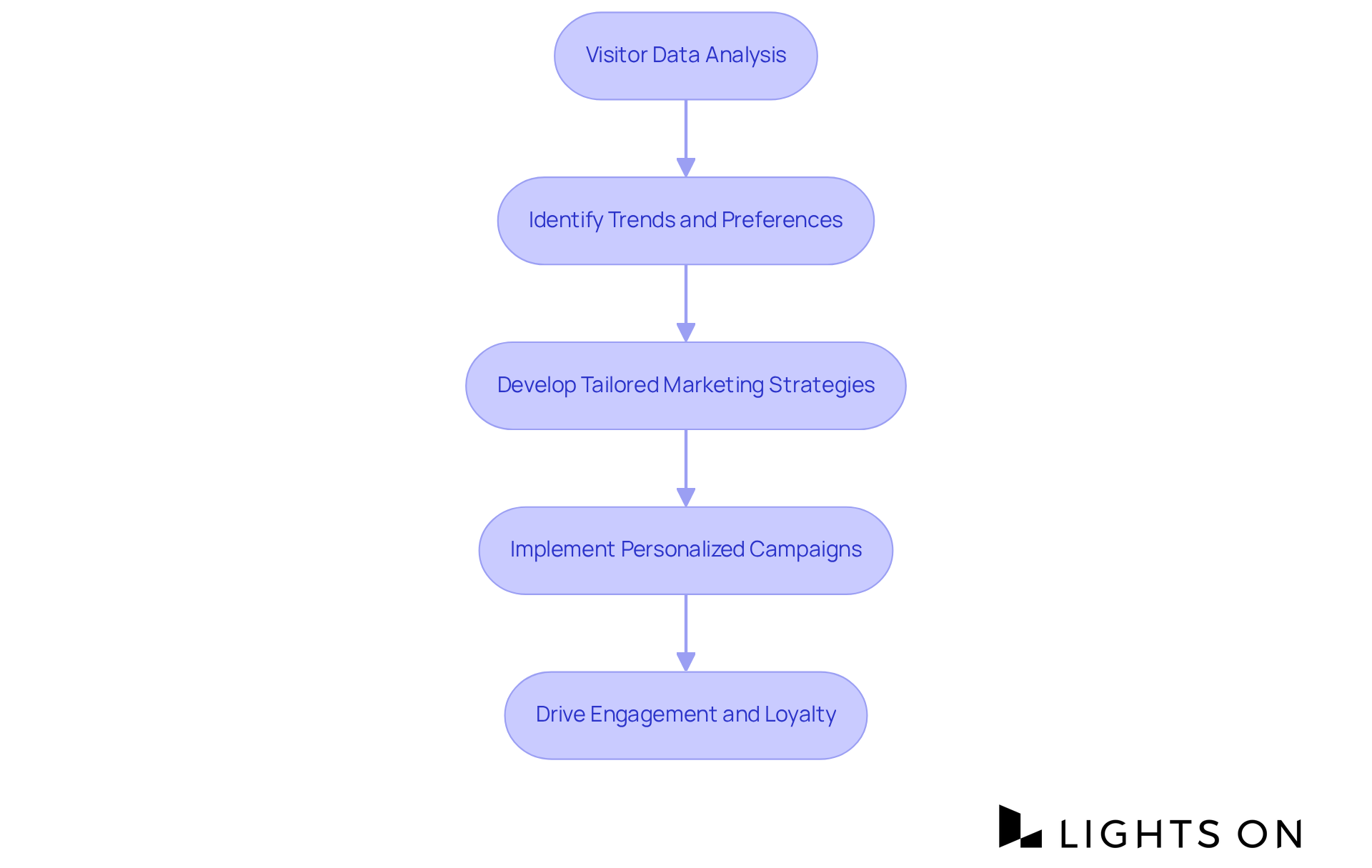
In 2025, visitors seek more than just a cozy bed; they desire moments that forge lasting memories. Hotels can significantly enhance their allure by providing unique packages that include local tours, culinary adventures, or wellness retreats. This strategy not only attracts guests willing to invest in extraordinary experiences but also drives revenue growth.
Research indicates that 75% of visitors are more inclined to return to an establishment that offers , underscoring the notion that satisfied patrons are more likely to recommend the venue to others.
As Brian Chesky, CEO of Airbnb, emphasizes, grasping visitor needs is essential for cultivating deeper emotional connections, which ultimately leads to loyalty and repeat business.
Furthermore, accommodations can implement targeted marketing strategies that highlight these experiential offerings, leverage social media to showcase visitor testimonials, and collaborate with local businesses to create exclusive packages.
By curating these experiential offerings and utilizing technology to enhance visitor satisfaction, establishments can position themselves as leaders in the competitive hospitality landscape, particularly by adapting to the latest hotel room trends to meet and exceed the evolving expectations of their clientele.

Virtual reality is revolutionizing marketing strategies within the hospitality industry, empowering accommodations to offer of their properties. These tours allow prospective visitors to explore rooms, amenities, and nearby attractions from the comfort of their homes, significantly enhancing their decision-making process.
Research indicates that establishments utilizing VR tours can achieve:
By integrating VR into their marketing strategies, accommodations not only create a compelling unique selling proposition but also foster deeper visitor engagement. As the sector evolves, the impact of VR on accommodation reservations is expected to grow, with immersive experiences becoming a vital component in attracting and retaining visitors by 2025. This trend underscores the critical need to embrace innovative technologies to remain competitive in a rapidly changing market.
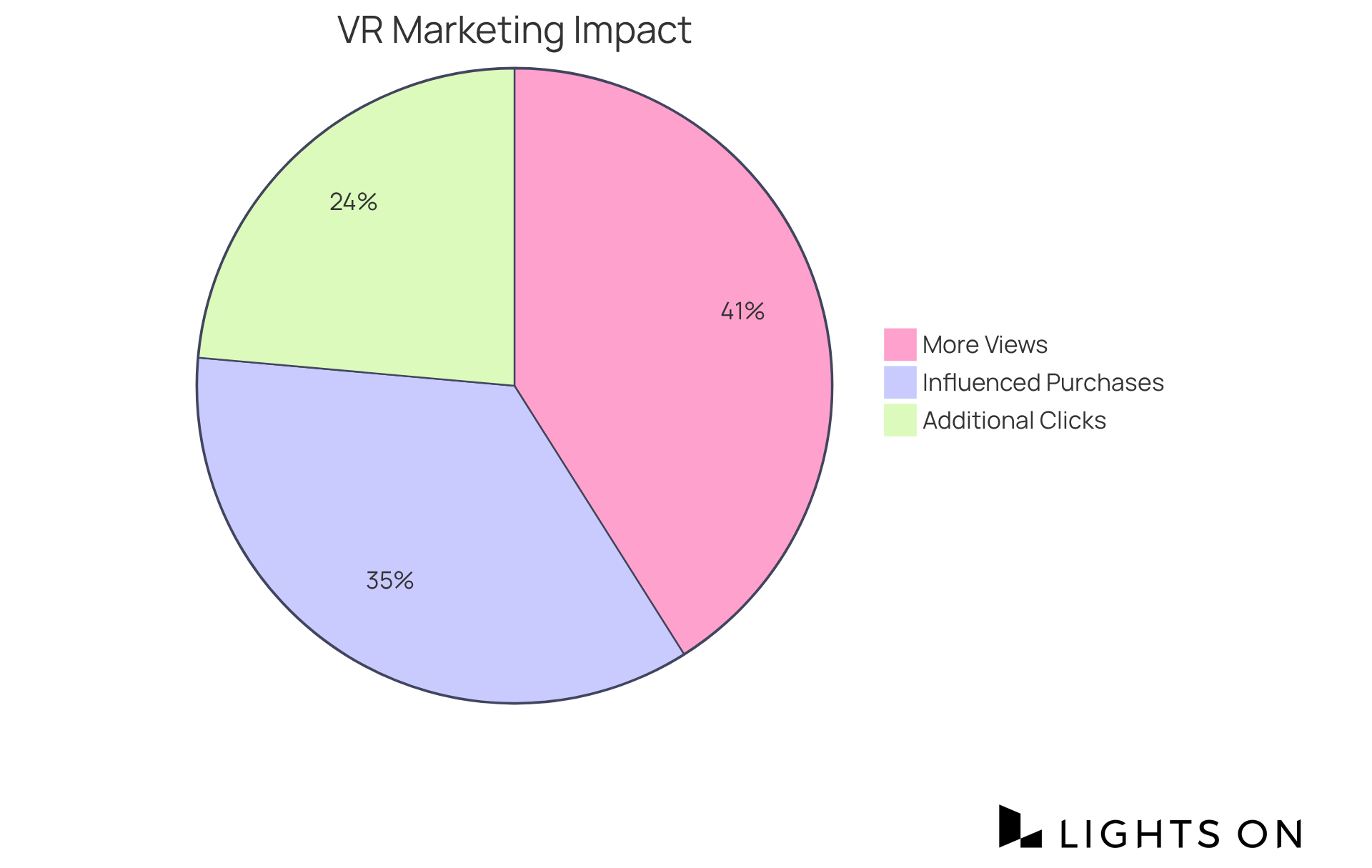
In 2025, hotel room trends are increasingly prioritizing health and wellness, reflecting a significant shift in visitor expectations. In hotel room trends, features such as:
are becoming standard. This emphasis on establishing a is in line with hotel room trends, attracting health-minded visitors and enhancing their overall enjoyment. Research indicates that 84% of U.S. consumers consider wellness a top priority, a sentiment echoed by 94% of consumers in China. By incorporating wellness programs, such as spa treatments and fitness classes, accommodations can align with hotel room trends to generate new revenue streams and further enhance guest satisfaction, promoting loyalty and encouraging repeat visits.
Furthermore, to successfully promote these wellness attributes, accommodations should emphasize them in advertising content and digital channels, demonstrating the distinct offerings they provide. As Maya Angelou wisely noted, 'Customers may forget what you said, but they'll never forget how you made them feel,' highlighting the significance of crafting unforgettable, health-oriented moments in hospitality.
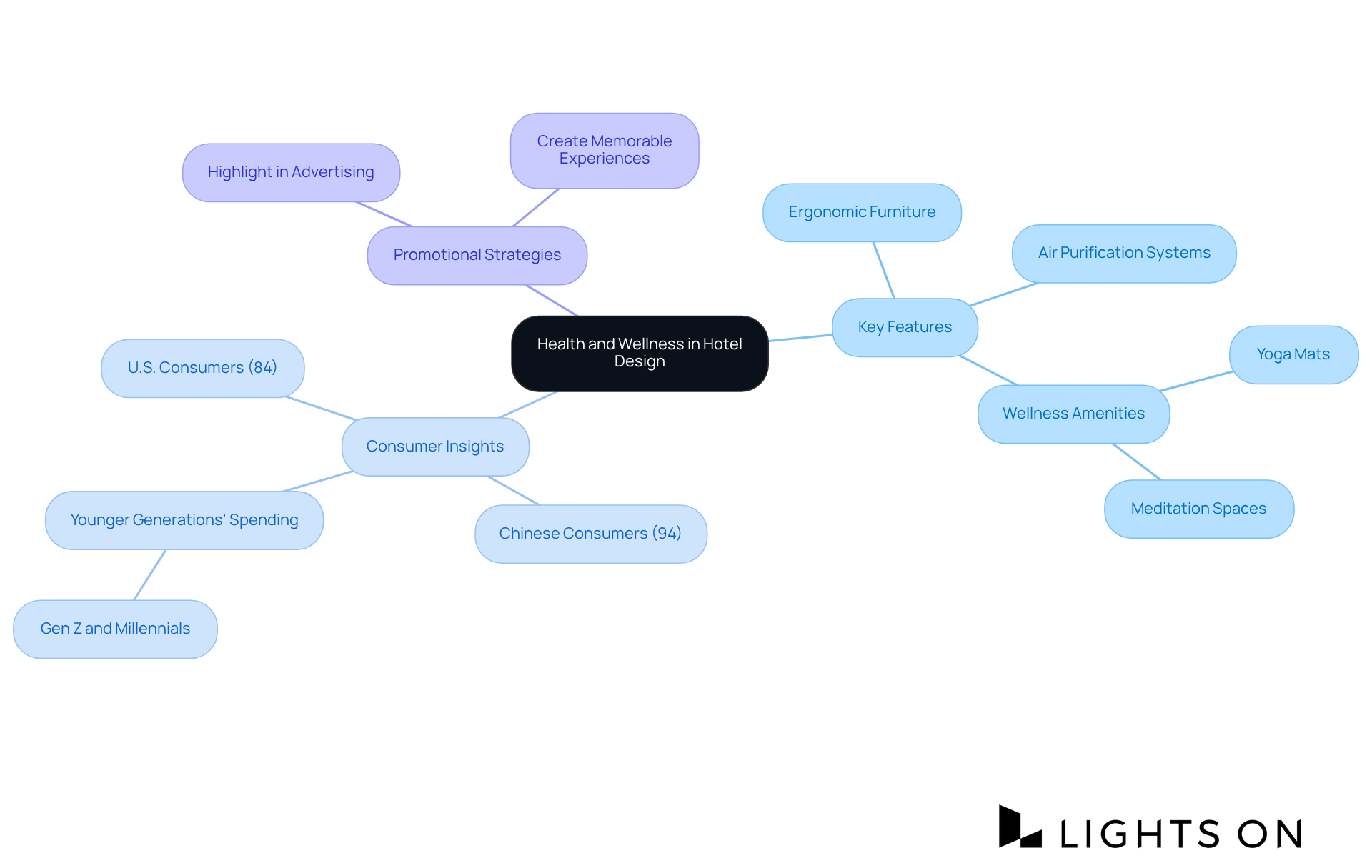
Social media strategies are essential for accommodations aiming to engage visitors and showcase their unique services. By crafting visually compelling content that highlights the accommodation experience, properties can effectively draw in potential visitors and increase reservations. Engaging with guests on platforms like Instagram and TikTok not only cultivates relationships but also nurtures loyalty among travelers.
, including guest reviews and photos, acts as powerful endorsements, significantly enhancing the establishment's reputation. Notably, 61% of travelers have booked accommodations after encountering them on Instagram, emphasizing the impact of social media interactions on booking decisions.
As hotels navigate the competitive landscape of 2025, prioritizing authentic engagement and harnessing user-generated content will be vital for capturing the attention of tech-savvy travelers and converting interest into bookings.

As the hospitality industry prepares for 2025, the evolution of hotel room trends is poised to redefine guest experiences. By emphasizing innovative technologies, sustainable practices, and personalized services, accommodations must adapt to meet the shifting expectations of travelers. The integration of strategic revenue management, artificial intelligence, and smart technologies will not only enhance operational efficiency but also elevate the overall guest experience.
Key insights from the article underscore the necessity of embracing eco-friendly designs, contactless solutions, and immersive marketing strategies, such as virtual reality. These trends cater to the growing demand for convenience and safety while fostering deeper emotional connections between guests and accommodations. Furthermore, the focus on health and wellness in hotel room design highlights the industry's commitment to creating relaxing and rejuvenating environments that resonate with modern travelers.
In conclusion, the future of hospitality lies in a holistic approach that merges technological advancements with a genuine focus on guest satisfaction. As hotels navigate these transformative trends, the call to action is clear: prioritize innovation, sustainability, and personalized experiences to thrive in an increasingly competitive landscape. By doing so, accommodations can ensure they not only meet but exceed the expectations of their guests, paving the way for lasting loyalty and success.
What is strategic revenue management in the hospitality industry?
Strategic revenue management involves optimizing pricing and inventory for accommodations to ensure guests access the best available rates, utilizing data analytics to implement dynamic pricing strategies that adapt to demand fluctuations and competitor pricing.
How does dynamic pricing benefit guest booking experiences?
Dynamic pricing improves the booking experience by offering competitive rates that reflect real-time market conditions, thereby maximizing revenue potential for accommodations.
Why is effective channel management important for hotels?
Effective channel management is crucial for distributing room inventory across various sales channels, which amplifies revenue opportunities and enhances the visibility of accommodations to potential guests.
What role does collaboration among departments play in revenue management?
Collaboration among departments like sales and marketing is essential to align revenue management strategies with overall business objectives, ensuring a cohesive approach to maximizing revenue.
How can accommodations adapt their strategies to changing market conditions?
Accommodation owners must consistently analyze market data and adjust their pricing and inventory management practices to respond to market trends and guest expectations.
What impact is artificial intelligence (AI) having on hotel operations?
AI is revolutionizing hotel operations by enhancing guest interactions through chatbots and personalized suggestions, as well as streamlining processes by predicting occupancy rates and optimizing staff allocation.
What are some benefits of AI in the hospitality industry?
Benefits of AI include increased operational efficiency, improved guest satisfaction, and the ability to foster loyalty through personalized experiences.
How are hotels integrating sustainability into their designs?
Hotels are incorporating eco-friendly practices by using sustainable materials, energy-efficient appliances, and water-saving fixtures, which not only reduce their ecological footprint but also attract environmentally conscious travelers.
Why is sustainability important to modern travelers?
Many travelers prefer to support businesses that prioritize environmental responsibility, making sustainability a key factor in enhancing visitor satisfaction and loyalty.
What trends are expected in hospitality by 2025?
By 2025, trends in hospitality will include strategic revenue management, the adoption of AI technologies, and the integration of eco-friendly practices as standard expectations among guests.
Transform your group booking strategies with Lights On and watch your occupancy soar.